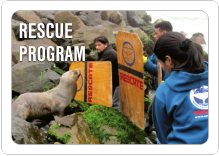|
The Stranding Network is a communication system that integrates different communities along the coast that call ORCA Rescue Team whenever there is an emergency involving marine mammal strandings, in order to carry out rescues and/or collect scientific data on these species in the wild. With our Center conveniently located close to Lima city in the middle of the country, ORCA covers over 1200Km of coastline assisting and documenting strandings whenever they happen.
This is the first real, continous, and fully operational Stranding Network developed in Peru under the bases of health assessment, medical attention and forensic examination of stranded marine mammals in Peru. Our Stranding Network has been functional since 2005 and has not stopped since then. The Stranding Network established by ORCA in Peru is directly connected to our rescue and rehabiliitation programs.

How does it works?
This network integrates ORCA with different communities along the coast working with government institutions like the Ecological Police. Our labor aims to develop The South Pacific Marine Mammal Center exclusively for the rescue, medical research and rehabilitation of sea-lions, dolphins, marine otters, penguins and sea turtles stranded along the coast.
The stranding network connects the general public, fishermen, private beach clubs, schools, city-hall police, local city halls, government environmental offices, Forest Service, Peruvian Navy, Ecological Police with our Rescue Hotline: 999389430.
ORCA Peru's Stranding Record has two decades of specialized data collected from over 6000 strandings from all the Peruvian coast. Our official stranding record includes data of the following species:
• South American sea-lions
(Otaria byronia)
• South American fur seals (Arctocephalus
australis)
• Galapagos fur seals (Arctocephalus
galapagoensis)
• Southern elephant seals (Mirounga leonina)
• Antarctic fur seals (Arctocephalus gazella)
• Marine otters (Lontra felina)
• Bottle-nose dolphins
(Tursiops truncatus).
• Dusky dolphins
(Lagenorhynchus obscurus)
• Common dolphins (Delphinus delphis)
• Gray's spinner dolphins (Stenella longirostris logitrostris)
• Eastern spinner dolphins (Stenella longirostris orientalis)
• Striped dolphins (Stenella coeruleoalba)
• Pantropical spotted dolphins (Stenella attenuata)
• Short-finned pilot whale (Globicephala macrorhynchus)
• Melon-headed whales (Peponocephala electra)
• Orcas (Orcinus orca)
• False killer whales (Pseudorca crassidens)
• Humpback whales (Megaptera
novaeangliae)
• Bryde's whales (Balaenoptera edeni)
• Sei whale (Baleanoptera borealis)
• Minke whales (Balenoptera acutorostrata)
• Fin whales
(Baleanoptera physalus).
• Blue whales
(Balaenoptera musculus)
• Right whales (Eubalaena australis)
• Sperm whales (Physeter
macrocephalus)
• Pygmy sperm whales (Kogia
breviceps)
• Dwarf sperm whales (Kogia sima)
• Cuvier's beaked whales (Ziphius cavirostris)
• Humboldt penguins
(Spheniscus humboldti)
• Galapagos penguins (Spheniscus
mendiculus)
• Leatherback sea turtles (Dermochelys
coriacea)
• Green sea turtles (Chelonia
mydas)
• Loggerhead sea turtles (Caretta
caretta)
• Pacific Hawksbill's sea turtles
(Eretmochelys imbricata bissa)
• Olive ridley's sea turtle (Lepidochelys
olivacea).
ORCA
"Rescue, Education, Science and
Conservation
Protecting Marine Life in
the Eastern South Pacific"
OCEANIZE YOUR LIFE!
|

















